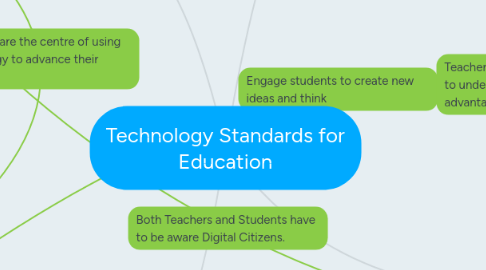
1. ISTE Standards for Students
1.1. Empowered Learner
1.1.1. Students use technology to increase their learning and understanding
1.2. Digital Citizen
1.2.1. Students understand how to work and live ethically in a globally connected world through technology.
1.3. Knowledge Constructor
1.3.1. Students are able to use different sources to construct a knowledge base for themselves.
1.4. Creative Communicator
1.4.1. Students use a variety of technologies to communicate on different platforms and using different technologies.
1.5. Computational Thinker
1.5.1. Students use technology to their advantage in problem solving and in their studies.
2. Learning and Technology Policy Framework
2.1. Student-Centred Learning
2.1.1. Students use technology to assist their learning using digital mediums to access knowledge.
2.2. Research and Innovation
2.2.1. Teachers and educators have a need to stay up to date and use innovations in education.
2.3. Professional Learning
2.3.1. Teachers and educators use their skill base to effectively and efficiently use technology to enhance learning
2.4. Leadership
2.4.1. Leaders in education build policy in government to use technology for the betterments of students.
2.5. Access, Infrastructure and Digital Learning Environments
2.5.1. All invested in education have access to the devices and infrastructure needed to develop useable learning environments.
3. ISTE Standards for Teachers
3.1. Facilitate and Inspire Student Learning and Creativity
3.1.1. Teachers use their knowledge on what they are teaching and the skills they have to engage students with subject matter and inspire their creative thinking
3.2. Design and Develop Digital Age Learning Experiences and Assessments
3.2.1. Teachers can use technology to maximize the learning of their students through the incorporation of technology into lessons.
3.3. Model Digital Age Work and Learning
3.3.1. Teachers Exemplify how a professional uses technology to assist in their work and daily lives.
3.4. Promote and Model Digital Citizenship and Responsibility
3.4.1. Teachers understand how technology can be misused and how to use technology ethically and instruct their students on how to use technology in an ever changing global landscape.
3.5. Engage in Professional Growth and Leadership
3.5.1. Teachers exemplify growth as a technology user and modify their understanding and knowledge to the ever evolving changes in technology.
4. ICT Program of Studies
4.1. Communicating
4.1.1. Students are expected to be able to use a variety of technologies to communicate
4.2. Decision Making
4.2.1. Technology will be used to seek alternative viewpoints, and to construct personal knowledge.
4.3. Problem Solving
4.3.1. Technology is a useful tool in the problem solving and can be used to analyze information and discover information.
4.4. Foundational Operations
4.4.1. Student's need to understand the nature of technology in order to fully utilize it. Technology has to be used ethically morally and safely.
4.5. Processes for Productivity
4.5.1. Students will use technology to increase their productivity and communication. Their skills will allow them to create and edit work in multiple different formats.

